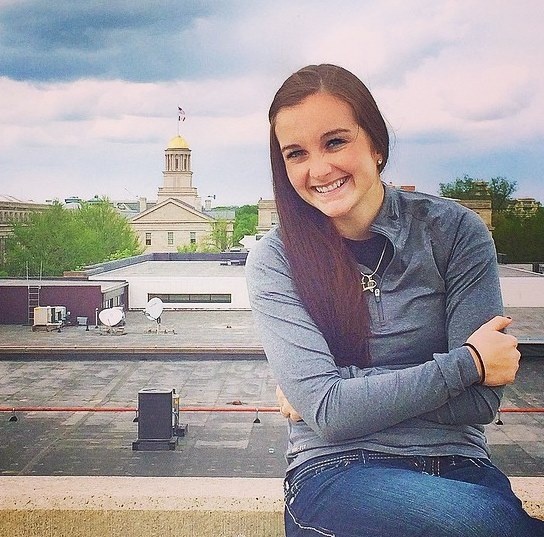Muscatine native Ali Moss always thought she wanted to be a teacher.
That is, until she participated in a first-year seminar at the University of Iowa in the fall of 2013, titled "So You Want to Be a Teacher. What Does That Mean?"

As it turned out, Moss discovered teaching was not her calling.
But it was during the 10-week course that Moss, now a junior majoring in communications studies, minoring in human relations, and pursuing a certificate in leadership studies, found her true passion—higher education and student-affairs programming.
Moss shared her experiences with the first-year seminars at a presentation to the Board of Regents, State of Iowa, on Wednesday, Oct. 21.
“I came into college thinking that I wanted to go into secondary education and teach high school history or possibly teach late-elementary or early middle school students,” Moss says. “The seminar included a practicum experience where we went to an Iowa City elementary school and spent time working with their after-school program.”
Though this was a fun experience, she says it allowed her to see that teaching wasn't necessarily the best fit for her, especially at the primary level.
“It was hard to realize that after planning for years to become a teacher, but I quickly found a better fit by learning about higher education and student affairs, which would still allow me to work with students,” Moss says. “I was really grateful for that realization in my first semester, rather than further down the road when I was in practicum or student teaching. I found the perfect mix of my interests—a communication studies major, a human relations minor, and a certificate in leadership studies—that will prepare me professionally.”
Building a foundation for academic success
The seminars have grown in popularity over the past eight years. In the fall of 2008, 25 sections were offered, enrolling 532 students; this fall, 131 sections are offered, enrolling 2,088 students.
Designed to connect faculty and students in order to build a foundation for academic success, these courses are primarily taught by tenure-track faculty and senior administrators. The average class size is 16 students.
Part of the allure for both faculty and students is that topics are selected by the instructors and cover a wide variety of subjects, often touching on current news topics or popular culture.
Fall 2015 examples include:
- University of Iowa Unwrapped: Exploring Hidden Hawkeye Places
- Refugee Lives and International Law
- Jazz Culture in Iowa City
- Storming the Castle: Adventures in Robot Theatre
These themes are often chosen because they are related to faculty’s research or explore a topic that has always fascinated them—or it might provide a glimpse into their academic areas.
“What I really enjoyed about this seminar was the small class size, which allowed me to engage in some really great conversations with my classmates,” Moss says. “We talked a lot about issues teachers today face and also completed a research project over new popular educational topics. The roundtable seminar setting allowed me to create a close community with those in my class and get to know my professor as a person. I truly am not sure how I would have managed my transition without the community I made in my first-year seminar.”
Moss adds that the class was vital to her success as a UI student, leading to many leadership opportunities, including her involvement in Students to Assist Recruitment (STAR) in UI Admissions and being a Hawkeye Host for the UI football program.
She has also been involved in orientation for two years and is a resident assistant in University Housing and Dining currently residing in Petersen Hall. She is also on the National Residence Hall Honorary Executive Board and is a member of Salt Company.
“I would contribute a lot of my success as a student to the connections that I made my first semester at Iowa. It was without a doubt my hardest semester with transitioning to college, but the communities that I felt a part of are what kept me at Iowa,” Moss says. “Going to a class where everyone knew my name, being on hall government, and getting an on-campus job for the summer were all small things individually but made a big impact on my Iowa experience moving forward.”
Helping students transition, explore career paths
The seminars have a positive impact on students' successful transition to campus life says Angie Lamb, University College administrator and course management/HR unit representative.
“I think one of the greatest values for students is that they get to connect with their peers and become engaged in a course that is of interest to everyone in the class,” Lamb says. “The experience of being in a first-year seminar can also help students feel like they fit in on campus and can decrease their level of anxiety and homesickness.”
This also leads to better retention rates for UI students, according to Andrew Beckett, assistant dean in University College. Both Lamb and Beckett participated with Moss in the presentation to the Board of Regents.
For example, the fall 2013 persistence rate for students enrolled in first year seminars was 88.3 percent versus 82.3 percent for those who did not enroll in a first-year seminar.
The impact was even greater on Pell-eligible students’ success, with a retention rate of 81 percent for those who participated in the first-year seminars versus a 74 percent retention rate for those who did not participate in a seminar.
The seminars are also a valuable way for students to explore potential careers paths, Beckett says.
“I think those types of experiences in small, discussion-based courses promote reflection and critical thinking,” Beckett says. “They help students grapple with their values and help students develop their own belief system. I think Ali’s journey in choosing a different career path is one that many of our students experience during their time at Iowa.”